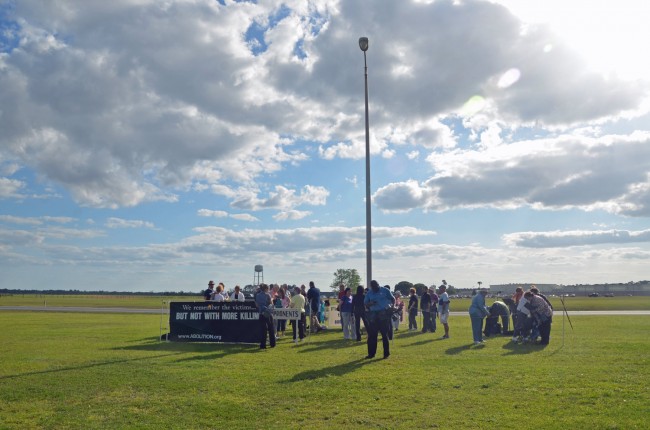
Last Updated: 9:39 p.m.
I’m inviting you to join me at an execution this evening, Florida’s fourth this year. Larry Eugene Mann, 59, is scheduled to be killed at 6 p.m. by lethal injection in the state’s death chamber at Starke prison, 75 miles northwest of Palm Coast. I’ve never been to an execution. And by going to one, I don’t mean that I’ll be a witness to it. I would refuse even if offered the dishonor, as reporters frequently are. I’ll be witnessing the vigils, the protests and the counter-protests outside the prison grounds, which take place every time there is an execution. It’s become part of the ritual of executions across the country, though neither executions nor protests (and supportive demonstrations, because those happen, too) get more than a few paragraphs’ coverage here and there, and virtually no more than a passing mention on the evening news, ahead of the weather.
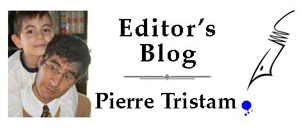 After covering a recent workshop on the death penalty in Florida, I decided to join Father Phil Egitto, the pastor at Our Lady of Lourdes, the Catholic church in Daytona Beach, and the bus-load of people he has taken to every single execution at Starke for years, to stand vigil. The bus made a stop at the Winn-Dixie shopping center near Woody’s Barbecue on State Road 100 at 3 p.m. this afternoon. I boarded it, along with Jackie Morelewicz, who organized the March workshop, and who usually stands vigil, in protest of executions, outside the Flagler County Courthouse, whenever needles ready to end a life in Starke. We’re not likely to be back in town until 9 or 10 p.m. I have no idea how the afternoon and evening will go. I will do my best to chronicle it here as it unfolds. the account will be written in reverse order: the fresher entries will appear at the top.
After covering a recent workshop on the death penalty in Florida, I decided to join Father Phil Egitto, the pastor at Our Lady of Lourdes, the Catholic church in Daytona Beach, and the bus-load of people he has taken to every single execution at Starke for years, to stand vigil. The bus made a stop at the Winn-Dixie shopping center near Woody’s Barbecue on State Road 100 at 3 p.m. this afternoon. I boarded it, along with Jackie Morelewicz, who organized the March workshop, and who usually stands vigil, in protest of executions, outside the Flagler County Courthouse, whenever needles ready to end a life in Starke. We’re not likely to be back in town until 9 or 10 p.m. I have no idea how the afternoon and evening will go. I will do my best to chronicle it here as it unfolds. the account will be written in reverse order: the fresher entries will appear at the top.
We were told to bring food or a snack and some drinks, because of the length of the trip. I brought a ham-and-cheese sandwich (American cheese, incidentally: the Swiss don’t execute) and a container of water. I mention these details because to me they’re no less absurd than talk of the walking dead man’s last meal: we’re going to an execution, but we’ll still get hungry and thirsty, which seems to me natural and obscene at the same time, as matter-of-factly obscene, actually, as the entirety of the rituals surrounding an execution, inside and outside the prison walls.
![]()
9:39 p.m. Time to call it a night. We’re approaching Palm Coast on I-95. We’ll be dropped off at the Winn-Dixie shopping center. We’ll reclaim our cars, drive home, have a beer, watch what degenerate TV may be worth watching with spouse and son–skipping the 11 o’clock news, as always–and eventually go to sleep like any other night. In some ways we might as well have gone to a minor league baseball game. We might as well have gone to the Lake County fair. Or to a beheading. There’s an inevitable blending of absurdities when horror and banality so easily mingle, or maybe collude–what Hannah Arendt called the banality of evil in a somewhat different context that happens to apply just as well here: she argued that the Holocaust wasn’t the work of nut jobs, but of men who thought what they were doing was as normal as it was necessary. The very same principle that underlies our own machinery of death, and why Father Egitto so easily–and with so much conviction–calls it “evil.” Some people like to think they touch the face of god once in a while. We grazed the face of evil today, from quite a distance, but distances in that context are irrelevant.
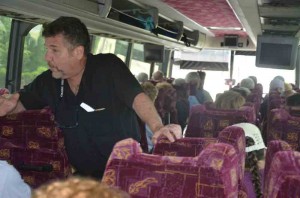
The barbarism of state-sponsored executions is his here and now. He’s been going to those vigils for seven years. It hasn’t always been in a bus as big as the one we’re riding now (at a rental cost of about $800 to a parish that is nowhere near rich: “We’re living paycheck to paycheck,” Egitto says.) But the groups have been sizable. That’s a lot of executions. Today’s was the 15th since the beginning of 2006.
“We do this because the state kills in our name,” Egitto says. “If we don’t do this then we’re complicit with evil. So we do this because we want to say to the governor, to the state, that you’re not killing in my name.” As Egitto saw it, he had two choices: he could leave Florida, or he could stay and protest. He stayed. He doesn’t call it capital punishment. He doesn’t even call it killing. “I consider it murder,” he says. And murder worse than most murders committed by the sort of people who end up on death row–more premeditated, more sober, less excusable by mental imbalance or psychosis or drugs or alcohol or misjudgment or youth or whatever else death row defendants throw at the justice system when they’re trying to get out of their sentence. When the state kills–when it murders–it is doing so with ultimate premeditation. “We are knowingly, premeditatively, planningly, willingly killing somebody,” Egitto says. And, he adds, we’re “teaching the culture that it’s all right to kill.”
A little after 9 p.m., Egitto took to the bus’ microphone and spoke of the afternoon and evening, and asked various members of the group to describe how they felt. One man spoke of anxiety ion the approach of 6 p.m., then relief after the ringing of the bell. A woman called Ellen said: “It was her first time, she didn’t know what to expect, she liked the prayer service and the ringing of the bell, and described the whole experience as “very sobering and touching, particularly the attorney.” She was referring to the inmate’s attorney, who came out to speak with the group after the execution. (See below.)
“On behalf of the people from Flagler County we want to thank you,” Jim Morelewicz said, representing the congregation from Flagler Beach. “It has been a very warm and gracious group. We are very thankful.”
I also spoke with Sean O’Dell, principal at Lourdes Academy. He’s been making the trips to Starke for seven years as well, at times with students. He described his first time, different from all other times since, because you “can’t really believe you’re really there as someone is being killed across the way.” This time, he said, he was surprised by the number of “proponents” of the death penalty, though they did not do what they had once done at a previous execution, when O’Dell had brought several students with him: the proponents cheered the moment the protesters rang the bell to signal the moment of death.
8:37 p.m.: As we ride the bus back to Flagler in the dark, we pass by a burst of lights in the myriads scintillating against the black sky like a flying-carpet casino. Someone in the bus yells out, “Hey, it’s the Lake County Fair!” There’s a faint cheer, maybe more sardonic than wistful. If not, it ought to be sardonic. None of us is quite in a fair mood. The bus–one of those gigantic things you see shuttling people to airports or around the Eiffel Tower–never slowed.


7 p.m.: There’s a white tent set up with a modest dais a couple of football fields’ length from the pro and con gatherings, where the witnesses to the execution are supposed to be taken, along with members of the victim’s (the murdered victim, not the murderer’s) family. But so far, no sign of life anywhere. We only hear the mooing of cows in the distance (there are innumerable cows lounging in packs along the fence that separates their pasture from the state prison’s grounds). Next to the white tent, just two television trucks. Sometimes there are many more, Mark Elliott, who heads Floridians for Alternatives to the Death Penalty, was telling me moments ago, after remembering the time 32 years ago when the murder took place, not far from his neighborhood: he’s from Tampa. He comes to these executions every time. Has been making the three-hour trip for about 10 years or so.
“To have executions and not have anyone here,” Elliott says, “anyone bear witness, anyone protest, that’s what I would worry about the most.” But he’s not been having to worry about it. The crowds are growing, not diminishing, just as the movement to abolish the death penalty is gaining momentum, if not quite as much in Florida. “It’s our elected leaders who haven’t evolved as much as their constituents. But they will.”
6:05 p.m. After a long silence, the church group began ringing the loud, cylindrical bell, at 6 p.m., signaling the death of the inmate.
Several members of the church group rang the bell, yelling out “Not in my name” and “not in God’s name,” among other words. Then silence. Murmurs. Low chatter. The odd laughter–unrelated to any of this–from a small group of Florida Highway Patrol troopers, who have simply been assigned to these grounds and have no official interest one way or the other in the proceedings.
Then the wait: first for the van that carries out the witnesses the execution. Then for the hearse–or the coach, as they call it here–that brings out the body of the dead man.
I’m not going to say that any of this is surreal, because it’s not. There’s too much traffic–traffic of every kind: passing cars, people, voices, birds, bugs–to lend the scene anything surreal. This is common. It happens every few months here, every few days somewhere in the country. That’s what it’s been reduced to (not that it had ever been elevated into something else): a vague event a few people will pay attention to, a cause for small (very small) protests and counter-protests, for a few hours anyway, and then onto the next execution. The irony is how cheap death can be made to seem, in a system that costs the state $50 million a year.
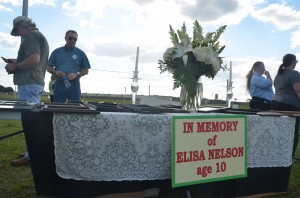
5:24 p.m. We arrive on the prison grounds. There’s a little excitement in the bus when the passengers eye another bus already here. Not of the same thinking: it’s a bus-full of proponents of the death penalty, bringing people from the Tampa Bay Area, where the victim of this latest murderer to be put to death was killed in 1980.
5 p.m.–We arrive in Starke, a town like any other, as unremarkable as its Kangaroo, where we stop for the first time since Palm Coast to give the two dozen people aboard the bus a chance to stretch out, buy a few snacks. I’m nagged by this memory, or odd connection: how the Poles and Germans who lived in the towns neighboring Nazi death camps would go about living their lives, watching the trains come in with their loads of human cargo, go back empty. There’s no serious comparison, except in the particular of one method: it was in Nazi death camps that lethal injection was first developed.
4 p.m.–There is virtually nothing redeeming about Larry Eugene Mann, the 59-year-old scheduled to be killed by the state of Florida, by lethal injection, at 6 this evening. Thirty-two and a half years ago–the morning of Nov. 4, 1980–Mann murdered 10-year-old Elisa Vera Nelson as she was biking to Palm Harbor Middle School, a bit late, with a note from her mother to her fifth-grade teacher to explained she’d been to the dentist that morning. She lived in a Tampa suburb.

He was sentenced to death three times, beginning in March 1981. The first sentence was vacated by the Florida Supreme Court, the second by a federal court. The third, in 1990, stuck. Mann’s attorney, Marie-Louise Samuels-Parker Friday sought a stay of execution from the Florida Supreme Court.
Elisa would have been 42 this year.
![]()
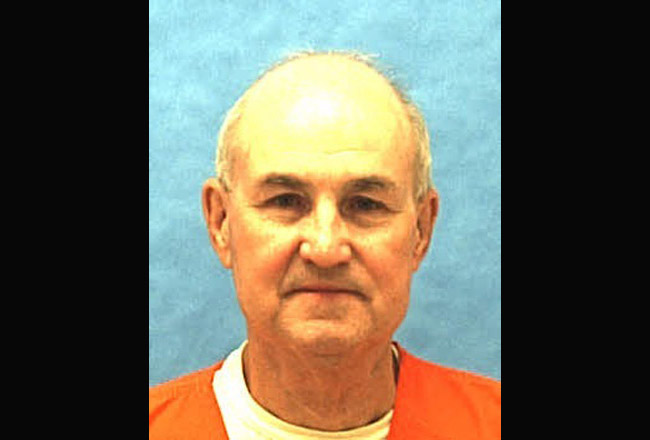





























Dana Galbraith says
Thank you for the play by play of this execution. It seems the opponents of the death penalty and the defenders of this murderer/pedophile are justifying their opposition to his just punishment by standing behind the word of God. I invite them to read the Bible. God, in both the Old and the New Testament gave authority to government to make laws and enforce them. This man has finally received his just punishment because as God has ordained there is always a consequence to sin-even if the sin is forgiven. Today, God is the final judge that Larry Mann with stand before. Unfortunately, for the Nelson family,the justice took much too long to carry out and in fact became torture to them-reopening their grief over and over as the case was appealed over and over again over trivial details. THAT-is the real sin in this whole case-that and the death of a beautiful, innocent child. My prayers are with the Nelson family and our government that they will make our system more just by expediting the death sentences of murderers such as Mann.
I say says
Don’t do the crime if you don’t want to pay the consequences. The victim didn’t get an extra 40 years of life after the incident as this jerk did. He should have been injected within a year of being found guilty! Better yet, should have been put to his death the same way his victim was brought to her death. His family will never feel the pain the victim’s family felt.
RG says
With out the Justice system carring out punishment, that the victims deserve, than we would be left with lynchings and miscarriges of Justice. while on earth we shall pay with our lives. Let God sort the Souls out after death. No one says you cant pray for these people on death row.they just dont belong to anyone not even themselves. The State owns them and will dispose of thier nasty butts appropriately. Just like putting the trash out on Tues and fridays.
Gia says
What of waist of time & money.That vermin should have been hung longtime ago.
johnny taxpayer says
Excellent article Pierre. It’s easy to argue for the death penalty when you talk in generalities like “inmate” or “murderer”, it’s quite a bit more difficult when it is a real human, no matter how heinous, we’re putting to death, as the Priest correctly says, “in our name”.
r&r says
This scum bag should have been put down within six months of the conviction.. He got a lease on life complements of the tax payers and the judicial system for over thirty years.. All convicted murdrers should be executed in six to twelve months of the trial. The victims family should get closure and not have to live knowing this dirt bag is enjoying himself and they’re paying for it..
stjohnspatriot says
Is there really ever any closure for the victims’ families? The condemned sleep comfortably in their graves while the victims’ loved ones live day after day in horror. Doesn’t seem like justice to me.
Ted says
So if by chance someone that you are so anxious to put down in 6 months after conviction is innocent, what do you say then? In case you are oblivious to this, our so-called system has made mistakes and convicted the wrong people.
Julius B. Carey says
I’m very pro-capital punishment & believe there should be a 7 year cap on any & all appeals. These are only the cases which relied upon victim identification or cases with no DNA, etc.,. On the cases where there is no doubt whatsoever I say 3 months max from sentencing to execution. Those would be your convictions using DNA, or muliple eye witnesses, etc.,. This 10- 15- or even longer garbage has to cease. All that’s doing is making the attorneys rich & chipping away at the tax payers monies needlessly. For you who are against this punishment no matter the guilt of the condemned I say you’re wrong! Any governor has the power to suspend a life without parole sentence for any reason they deem. Therefore LWOP is not always what it says…
FRANK DILIBERTO says
Goodbye Larry Eugene Mann, you received what you deserve. The system worked this time.
Howard Duley says
This guy lived thirty years to long. If the bleeding heart liberals were willing to shoulder all the cost for keeping them alive then let them have their way. If the criminal re-offends them the liberal and the criminal gets executed. Sound fair?
johnny taxpayer says
How much do you think the state spent defending all the appeals in the last 30 years?
concerned citizen says
SEE YA!! Rot away you POS!!!
Magnolia says
People will pine over a condemned convict, but could care less that millions of babies are slaughtered without benefit of trial…… Many are simply killed on the spot, with a jab of scissors to the back of their tiny head.
Where are the mourners for these people?
stay focused says
Magnolia- That has nothing to do with this case. This scum got what he deserved!!
Toni B. says
Thank you for going with us and putting into words what we have been experienceing for years. Very moving.